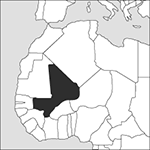
Source: MAPS IN MINUTES™ © RH Publications (1997)
Capital:
Bamako
Area:
1,240,192 sq km (478,841 sq miles)
Population:
15,968,882 (2013 est)
Currency:
1 CFA franc=100 centimes
Religions:
Muslim 94.8%; Christian 2.4%; traditional beliefs 2.0%
Ethnic Groups:
Mande 50.0%; Peul 17.0%; Voltaic 12.0%; Tuareg and Moor 10.0%; Songhai 6.0%
Languages:
French (official); Bambara; local languages
International Organizations:
UN; AU; Franc Zone; ECOWAS; Non-Aligned Movement; WTO
A landlocked country in north-west Africa, sharing common boundaries with Mauritania, Algeria, Niger, Burkina Faso, Côte d’Ivoire, Guinea, and Senegal.
Physical
The northern part of Mali is in the dry Sahara and its south is in the tropics. From the south-west, and through its centre flows the Niger, which provides fish. The Niger here has an inland delta which permits the seasonal growing of rice, while other areas contain sufficient pasture for cattle, sheep, and goats.
Economy
Mali is amongst the world’s poorest countries, with gold contributing four-fifths of export earnings. Agriculture employs four-fifths of the workforce, with livestock rearing predominant in the drought-ridden north and cotton cultivation in the southern savannah. Cotton and livestock are the other chief exports. Millet, maize, and rice are also important subsistence crops, and industry is based on food processing. Hydroelectric power contributes substantially to electricity supplies. In addition to gold, there are deposits of iron ore, marble, limestone, salt, and phosphates.
History
The Mali empire in the upper Niger region of West Africa was established in the 13th century. The founder, Sundjata, conquered the remains of the empire of Ghana c.1235–40 with his army of Malinke soldiers. Mali soon controlled the rich trade across the Sahara and became a major supplier of gold. The empire reached its peak in the early 14th century under Mansa Musa, who established an efficient administration. The Muslim traveller Ibn Battuta (1304–78) visited Mali in 1351–52 and gave a detailed account of the court and trade. However, by then the empire was beginning to decline. In 1335 Songhay became independent of Mali and by the 15th century had conquered the rest of the empire. After the Moroccan invasion of 1591, the Songhai empire collapsed. Mali was only freed from Moroccan rule at the end of the 18th century, when it was divided among the Tuareg, Macina, and Ségou. France colonized it in the late 19th century. In 1946 it became an Overseas Territory of France. It was proclaimed the Sudanese Republic in 1958, an autonomous state within the French Community. It united with Senegal as the Federation of Mali in 1959, but in 1960 Senegal withdrew and Mali became independent. A military government took over in 1968, under Lieutenant Moussa Traoré, who gradually re-introduced some degree of civilian participation. In 1974, as General Traoré he was elected President, and re-elected in 1985. Pro-democracy rioting began in 1990, and in 1991 Traoré was arrested and a National Reconciliation Council took charge under Lieutenant Colonel Amadou Toumani Touré. The Alliance for Democracy in Mali won a majority in the general election of 1992, its leader Alpha Oumar Konaré being elected President. He was re-elected President in 1997 but did not stand in 2002, when Touré was elected. From 2006 northern Mali was increasingly unsettled by Tuareg rebels and an al‐Qaeda offshoot, al-Qaeda in the Islamic Maghreb. Their activity intensified in 2012, and government defeats led to a military coup that ousted Touré. In the succeeding instability rebels declared the north independent, and in 2013 Islamist forces moved into the government-held south; however, French intervention quickly re-established government control of the whole country. Later that year Ibrahim Boubacar Keïta was elected President. In November 2015 22 people were shot dead in Bamako during a siege in a hotel; al-Qaeda claimed responsibility for the attack. Keïta resigned in 2020 after a coup d'état.
- Gujral, Inder Kumar (1919–2012)
- Guldberg, Cato Maximilian
- Guldberg rule
- Gulfian
- Gulf Stream
- Gulf War (1991)
- gull
- gullet
- gulling
- Gullstrand, Allvar
- gully
- gulp
- gum
- Gumbel distribution
- Gumbel, Emil Julius (1891–1966)
- Gum Nebula
- gun
- gunboat diplomacy
- guncotton
- Gunflint Chert
- gun metal
- Gunn diode
- Gunn effect
- Gunn-Peterson trough
- gunpowder